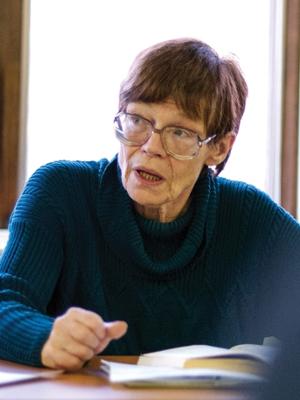Gillian Gane
Gillian Gane, Professor of English (1999-2007)
Memorial minute for Gillian Gane, Professor of English emerita, presented by Margie Thickstun, Professor of Literature & Creative Writing, on September 6, 2016.
 Gillian Hilary Gane was born in South Africa in 1943. She earned her first bachelor’s degree, in English and French, at Rhodes University, in the Eastern Cape province, in 1964. She received another, in applied linguistics, from the University of Witwatersrand in Johannesburg in 1967. How she managed that is an interesting question. During her time at Rhodes, Gillian had joined the National Union of South African Students, an anti-apartheid group; she became a regional secretary in 1963. Some sources suggest she was connected to the activist African Resistance Movement (ARM). In early July 1964, when she attended a national meeting of NUSAS, security forces were already looking for her.
Gillian Hilary Gane was born in South Africa in 1943. She earned her first bachelor’s degree, in English and French, at Rhodes University, in the Eastern Cape province, in 1964. She received another, in applied linguistics, from the University of Witwatersrand in Johannesburg in 1967. How she managed that is an interesting question. During her time at Rhodes, Gillian had joined the National Union of South African Students, an anti-apartheid group; she became a regional secretary in 1963. Some sources suggest she was connected to the activist African Resistance Movement (ARM). In early July 1964, when she attended a national meeting of NUSAS, security forces were already looking for her.
After a bomb detonated at a train station in Johannesburg on July 24th of that month, a number of members of NUSAS, including Gillian, fled to Swaziland. She was arrested upon her return to South Africa in February 1966 and imprisoned for a time in Grahamstown. Her file, available online, indicates that she was banned from July 13, 1966 to May 31, 1971. That banning order restricted her to Krugersdorp, a suburb of Johannesburg, and prohibited her from attending educational institutions. But the faculty at Witwatersrand had strongly protested the implementation of apartheid and subsequent restrictions on intellectual freedom. Apparently, Gillian and the University simply ignored the government injunction.
Before the ban ended, Gillian had moved to England, where in 1968 she earned a master’s degree at the University of Essex, and then to Massachusetts, where, at MIT, she started a doctorate in applied linguistics. She set that work aside in 1970 to do activism, which included co-founding Bread and Roses, a feminist restaurant, in Cambridge. In 1976, Gillian took a position as a lecturer at UMass-Boston. She served for seven years as assistant editor for College English and as an editorial advisor for the journal, Inkanyiso, and for African Journals Online.
While managing the above and raising her three children, Gillian earned her doctoral degree in literature at UMass-Amherst (1999), with a dissertation entitled Breaking English: Postcolonial Polyglossia in Nigerian Representations of Pidgin and in the Fiction of Salman Rushdie. Gillian’s work combined her interests in social justice, linguistics, and globalization as she addressed emerging literatures of the English-speaking postcolonial world. She published on writers as disparate as Dickens, Rushdie, Achebe, Soyinka, and Coetzee, and delivered conference papers on heteroglossia, polyglossia, pidgin, and the novels of Nadine Gordimer and Tsitsi Dangarembga.
Gillian was hired at Hamilton in 1999 to teach post-colonial literature and history of the English language—an unusual combination of responsibilities. She also collaborated with Lisa Trivedi in History to develop a sophomore seminar, “Cracking India,” that explored the historical and literary consequences of the British decision to partition the sub-continent. Gillian was actively involved in addressing pedagogical issues related to race, class, and gender, in workshops or just in conversation. A colleague reports that Gillian “demanded precision or explicitness when talking about ideas. If I made a generalization about students or about an author or any topic she would immediately raise a question, pose a counter example, ask me to define my terms etc. In this way Gillian, whose politics were always progressive, made sure that no one got away with sloppy thinking.”
After her retirement from Hamilton in 2007, Gillian returned to South Africa for the first time in 40 years to teach at the University of Zululand. Her article about that experience opens, delightfully, “Justice and Freedom were among the students in my Basic Reading class” and recounts the challenges of higher education in the context of language diversity and economic inequality. For two years she taught two sections of fifty students each, every semester, a reduced load acknowledging her status as “visiting staff,” often in windowless auditoria (a serious liability in a land of rolling blackouts) and without, of course, any technology.
On her return to the United States Gillian continued to teach courses in literature at UMass-Boston. She died of cancer on July 7, 2016 in Cambridge, MA, and is survived by her three children, Darrell, Casey, and Robin Gane-McCalla (Hamilton class of 2007).
